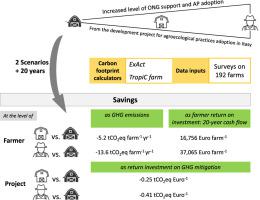Journal of Cleaner Production ( IF 11.1 ) Pub Date : 2020-11-19 , DOI: 10.1016/j.jclepro.2020.125220 Narindra Harisoa Rakotovao , Tiphaine Chevallier , Lydie Chapuis-Lardy , Sylvain Deffontaines , Syndhia Mathé , Mamonjiniaina Andriamirajo Ramarofidy , Tsifera Henintsoa Rakotoniamonjy , Adrien Lepage , Cargele Masso , Alain Albrecht , Tantely Maminiana Razafimbelo

|
Rural development projects to develop sustainable agriculture need to be assessed before engaging smallholder farmers at large scale. Data on agricultural systems to produce food, provide income for smallholders and reduce greenhouse-gas (GHG) emissions are scarce in Sub-Saharan Africa countries. Here, we assessed the potential of agroecological practices (AP) on economic benefits to farmers, GHG balance derived from agricultural activities, and efficiency of economic investments to mitigate GHG. The study was based on a NGO rural development project, which promoted AP: agroforestry, compost, and System of Rice Intensification. The economic and GHG mitigation benefits were projected over a period of 20 years on three scenarios. Two scenarios, differing by two expected levels of AP adoption, were compared to a reference one, in which there was no NGO intervention. Socio-economic, yield and soil data were gathered on 192 farms during five growing seasons (2013-2018). The GHG balance was estimated with TropiC Farm Tool and EX-ACT. The GHG emissions were reduced in both scenarios compared to the reference one: -5.2 to -13.6 tCO2eq farm-1 yr-1 for scenario 1 and 2 respectively. At the regional scale, the projected amount of C saved per euro invested was estimated at -0.25 tCO2eq euro-1 and -0.41 tCO2eq Euro-1 (or € 4 to 2.5 tCO2eq-1) under scenario 1 and scenario 2. The annual cash flow of farmers increased over the 20 years. Our study highlighted the potential of AP for increasing productivity and profitability of smallholder agricultural systems for the Malagasy farmers, while simultaneously contributing to climate change mitigation.
中文翻译:

农业生态发展后对马达加斯加Itasy温室气体平衡和农村经济的影响
在大规模吸引小农户之前,需要对发展可持续农业的农村发展项目进行评估。在撒哈拉以南非洲国家,缺乏用于生产粮食,为小农提供收入并减少温室气体排放的农业系统的数据。在这里,我们评估了农业生态实践(AP)对农民的经济利益,农业活动产生的温室气体平衡以及减少温室气体的经济投资效率的潜力。该研究基于一个非政府组织的农村发展项目,该项目促进了AP:农林业,堆肥和水稻集约化系统。在三种情况下,预计在20年的时间里将减少经济和温室气体排放。将两种情况(与AP的采用预期的两个水平不同)进行了比较:没有非政府组织的干预。在五个生长季节(2013-2018年)内,从192个农场收集了社会经济,产量和土壤数据。使用TropiC Farm Tool和EX-ACT估算了温室气体余额。与参考情景相比,两种情景下的温室气体排放均降低:-5.2至-13.6 tCO分别针对方案1和2的2当量场- 1年-1。在区域范围内,在方案1和方案2中,每欧元投资所节省的C量预计为-0.25 tCO 2当量-1欧元和-0.41 tCO 2当量-1欧元(或4至2.5 tCO 2当量-1)。方案2.在20年中,农民的年度现金流量增加了。我们的研究强调了AP在提高马达加斯加农民小农农业系统生产力和盈利能力的同时,还有助于缓解气候变化。


























 京公网安备 11010802027423号
京公网安备 11010802027423号